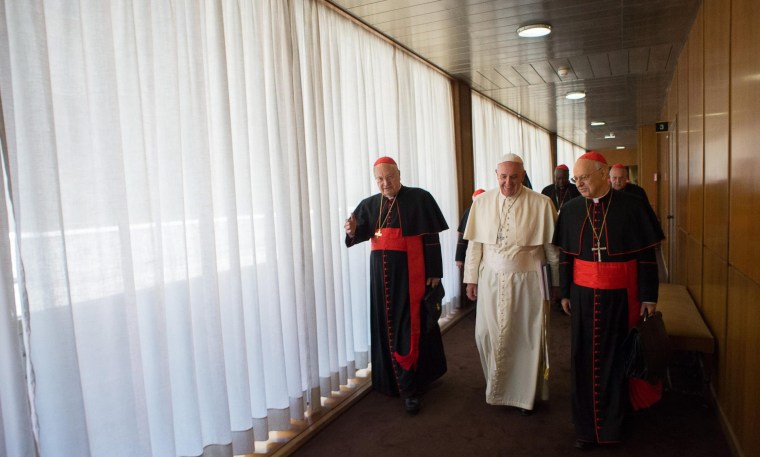LGBTQ rights groups have been quick to denounce a change in language to a Vatican report from an earlier draft, which spoke more favorably of gay people than any previous documents or comments from the Catholic Church's leadership.
But a prominent American Jesuit priest, Rev. James Martin, told msnbc "there is indeed a silver lining" for those seeking more openness from the church towards the LGBTQ community. Catholic Church bishops "had open and honest conversations about several matters that had, until recently, been largely kept off the table," he explained.
At issue is a church document known by the Latin word relatio. The final version, released on Saturday, was substantially different from a draft version released five days earlier on Oct. 13. The earlier release, posted online in English by the Vatican, stated:
Homosexuals have gifts and qualities to offer to the Christian community. Are we capable of providing for these people, guaranteeing [...] them [...] a place of fellowship in our communities? Oftentimes, they want to encounter a Church which offers them a welcoming home. Are our communities capable of this, accepting and valuing their sexual orientation, without compromising Catholic doctrine on the family and matrimony?
The final version, translated from Italian by the BBC, dialed those comments back:
The Church teaches: "No grounds whatsoever exist for assimilating or drawing analogies, however remote, between homosexual unions and God's design for matrimony and the family." Nevertheless, men and women with homosexual tendencies should be accepted with respect and sensitivity. "Any sign of unjust discrimination in their regard is to be avoided."
The title and length of the section concerning the church's relationship with the gay community also changed. The final document included a two-paragraph passage under the heading, "Pastoral attention towards persons with homosexual orientations," whereas the draft version from Oct. 13 included three full paragraphs under the more simplistic and cordial heading, "Welcoming homosexuals," according to NBC News.
Martin, who is editor at large of America Magazine and the author of Jesus: A Pilgrimage, said that Pope Francis himself insisted that paragraphs that were not approved by a two-thirds majority of the collected clergymen, known as the synod, remain in the document. Those additions included two paragraphs about the LGBTQ community and another about divorced and remarried Catholics.
"In other words," Martin said, "[the pope] made sure that for the next meeting those items would stay on the table."
RELATED: Rev. James Martin on the church's future
The Jesuit priest also insisted that the relatio is not sacrosanct, but is instead part of an ongoing conversation that "will set the agenda for next year's synod." Until that time, church leaders will reflect, pray, and discuss these and other issues. "So it's a starting point," he added.
"Pope Francis... has the final word."'
Eventually, the synod will release a final report, and the pope "will review it and issue his own statement," according to Martin. That final word from the pontiff — known as an "apostolic exhortation" — is what will eventually inform Vatican teachings. "So Pope Francis, after consulting with the bishops, has the final word," he said.
Martin is not alone in his assessment that the church's stance toward the gay community is evolving. Francis DeBernardo, the executive director of New Ways Ministry, a self-described gay-positive ministry advocating on behalf of LGBTQ Catholics, said that the synod's final report was disappointing, but showed promise. DeBernardo said the synod's "process and openness to discussion provides hope for further development down the road."
